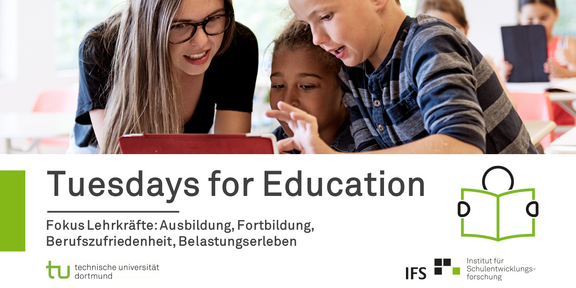Working together for better education: Tuesdays for Education Job satisfaction high, but teachers miss appreciation: Tuesdays for Education addresses well-being and training needs based on PIRLS study
- News
- Press release
- Institute

As part of the new Tuesdays for Education program series, IFS is taking a look at elementary school teachers on the 1st date based on the PIRLS study.
When you think of education, you automatically think of teachers. They play a central role in imparting skills to students. For this reason, the IFS's new Tuesdays for Education program series has made them the focus of its first evaluation. The current analysis, based on data from the PIRLS 2021 study, has shed light on the training needs and well-being of primary school teachers in Germany. Participants included 252 German teachers from 4,611 IGLU students nationwide.
Teachers: Satisfied with their job, but too often overworked and not valued enough
Some 45 percent of elementary school children in Germany are taught by teachers who said they feel overworked overall and often exhausted at school, and 38 percent by teachers who perceive a lack of appreciation. Nevertheless, the latter are generally satisfied with their jobs. For example, about 71 percent said they very often find their work meaningful and important. "The overall high level of job satisfaction is an important message with regard to attracting young people to study and become teachers", emphasizes Nele McElvany, executive director of the IFS. "Nevertheless, the perceived lack of appreciation as well as the reported exhaustion and overload are serious findings. Solutions must be found here in the interest of teachers but also their students."
Digital competencies or second language acquisition have hardly been addressed in the context of initial and in-service teacher training
Teachers have a central role in teaching competencies. Accordingly, quality professional training is important to enable students' educational success. However, according to the PIRLS 2021 data, only about half of fourth graders in Germany are taught by German teachers for whom the didactics of reading was a focus of study. Other aspects, such as theories of reading or methods for measuring reading literacy, occurred only as an overview or introduction for the majority. 50 and 45 percent of elementary school children are taught by German teachers for whom central topics such as digital competencies and second language acquisition were not addressed in their studies. Accordingly, the teachers surveyed formulate a need for further training in these areas. "No wonder," as educational researcher Ruben Kleinkorres from the IGLU team explains: "PIRLS 2021 has shown that migration-related performance disparities have not decreased compared to 2001. In other words, Germany has failed for more than 20 years to provide better support for children whose native language is not German. At the same time, more and more children with an immigrant background whose native language is not German are in schools. Teachers should be prepared for this in their studies so that these children can be well supported." The same applies to the teaching of digital skills: More than 42 percent of teachers see a high priority for further training in the areas of using digital media in reading lessons or generally on teaching in connection with digital skills. Nele McElvany summarizes: "The teaching profession is associated with a high level of intrinsic motivation. This makes it all the more important to give teachers the appropriate institutional and personal framework conditions so that they can teach students the basic competencies such as reading, writing and arithmetic in elementary school in the best possible way."
For more information, see the press release (German).






![[Translate to English:] [Translate to English:]](/storages/ifs-ep/_processed_/3/0/csm_iStock-1180187740_Orbon_Alija_bc1514e180.jpg)